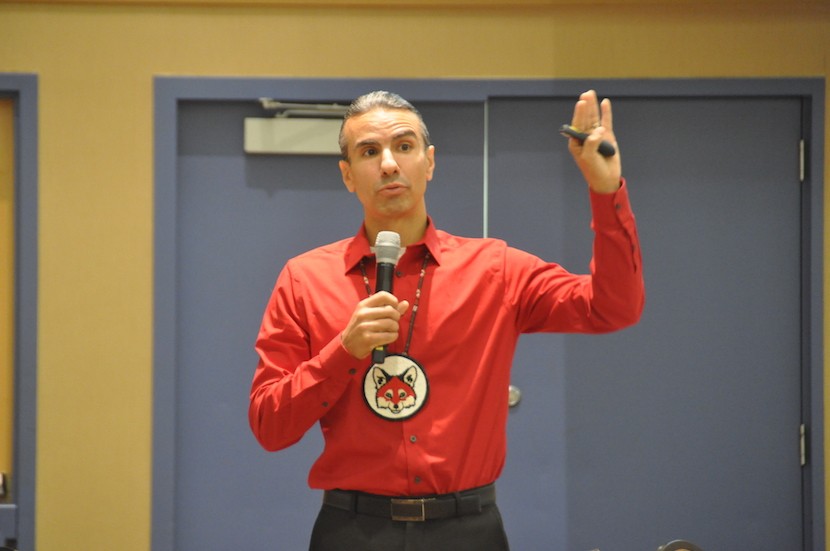
Band members, employees, and students gathered November 29 at Grand Casino Mille Lacs to hear a presentation by Dr. Anton Treuer titled “The Real Story of Thanksgiving: An Honest History.” Dr. Treuer is Professor of Ojibwe at Bemidji State University and the author of 14 books.
His presentation provided historical context rarely considered, beginning not with Columbus or the Mayflower, but with the early days of the Catholic church, when the “divine right of kings” and the Doctrine of Discovery were established.
According to the Catholic church, only a Christian king or queen had a right to rule, and land ownership came into existence through “discovery” by Christian nations. That meant any lands outside of Europe were there for the taking, which led colonizers and imperialists to claim Indigenous people’s lands in Africa, Asia, Australia, and the Americas.
Even though the Doctrine of Discovery is Christian in origin, and the First Amendment to the U.S. Constitution bans the establishment of a national religion, President Thomas Jefferson and the Supreme Court used the Doctrine to justify the taking of Indian lands.
Dr. Treuer emphasized the difference between European and Indigenous attitudes toward Mother Earth, and the devastating effects of colonization — from deforestation and pollution to extinctions and climate change.
“Roaming nomads”concept is false
The belief taught in schools that the Americas were sparsely populated by roaming nomads is false, he said. At the time of Columbus, about 50 to 90 million Indigenous people lived in the Americas — a dense population of elaborate societies with well-developed agriculture systems. In fact, the Aztec capital of Tinochtitlan had three times the population of London, the largest city in Europe at the time.
But that myth of “roaming nomads” is a “get out of guilt free card,” Dr. Treuer said — a way to justify the colonization of North and South America.
Colonialism lives on in American schools
He also shared his own story and that of his children, including a son who loves to sing but is forced to learn Christian songs in choir at the local public school. “If he wants to be in choir, he has to sing the praises of Jesus,” he said.
As a parent, he is left with a difficult choice: encouraging his son to use his gift while immersing him in Western Christian culture, or taking him out of public schools and denying him the ability to sing in a choir. “What kind of parent should have to make a choice like that?” he asked.
“We are still colonial,” Dr. Treuer said. “The federal government passes legislation that requires each state government to develop standards of education, and each state develops standards that teach colonialism … and will deny any meaningful chance for anybody who is not white or Christian to be fully validated through their educational experience even though 51 percent of students are students of color. The curriculum is a white-empowering curriculum that succeeds in empowering white children and succeeds at disempowering everyone else.”
The Thanksgiving story itself is largely fiction — emphasizing cooperation between colonizers and Indians while glossing over the real story. Dr. Treuer separated fact from fiction regarding historical figures like Papspahegh (Powhatan), Pocahontas, Patuxet Tisquantum (Squanto), and Wampanoag Chief Massasoit.
He also shared little-known history about the kidnapping of Chief Tatobem, the Battle of Mystic River in which 700 Pequot were killed, the reduction of the Pequot population from 16,000 to 500, and King Philip’s War, in which 5 percent of British were killed compared to 40 percent of Natives.
Whites and Indians are both victimized by the false narratives of Thanksgiving and the colonization of the continent. “Oppression dehumanizes everyone,” Anton said.
Native resilience
He stressed the strength and resilience of Native people and cultures in the face of massacres, exile, broken treaties, boarding schools, smallpox blanket, poisoned rations, religious persecution, alcohol, prisons, and hazardous waste.
“We are more than the sum of our tragedies,” Dr. Treuer concluded. “We have many blessings. Miigwech.”
This was the second of two DNR-sponsored educational events to mark Native American Month in November. The first was a presentation by Dr. John Gonzalez, a professor of psychology at Bemidji State University, titled “Two Sides of the Same Coin: Race Relations and Economic Disparities.” (See the December issue of Ojibwe Inaajimowin or click here for more on that presentation.)